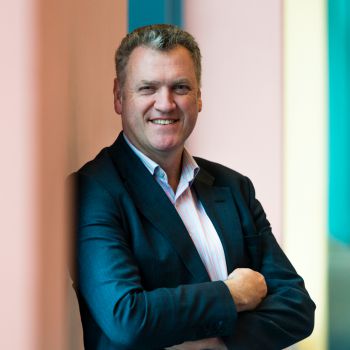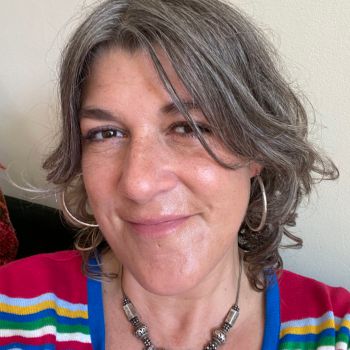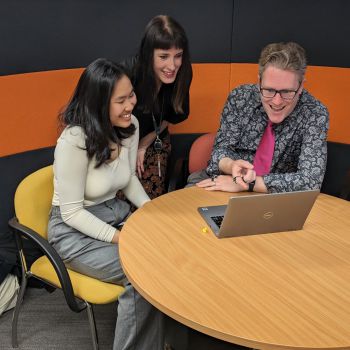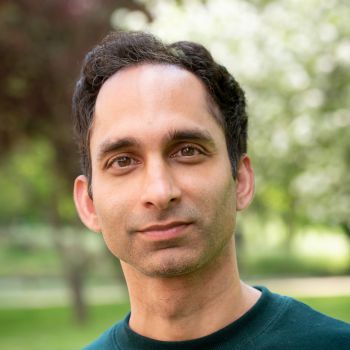Six more projects awarded up to £5000 from the Education and Innovation Fund
Posted on behalf of: Internal Communications
Last updated: Wednesday, 22 May 2024

Six more original projects have been awarded up to £5,000 in the latest round of awards from the Education and Innovation Fund.
Launched in October 2022, the fund aims to drive positive changes in how we deliver our teaching and learning experience by stimulating student and staff co-creation and rewarding innovation and teaching excellence.
Find out more about the winning projects
Addressing students’ perceptions of academic integrity: The case of plagiarism

Project lead: Thomas Ormerod
This project aims to explore students’ perceptions of academic integrity and to develop interventions to increase their confidence to produce original work.
Plagiarism remains a critical problem for universities, with many staff lacking insight into students’ motivations and understanding of the underlying factors that lead to this behaviour. The reasons for plagiarism may extend beyond intentional misconduct, encompassing factors such as misunderstanding academic expectations, dispositional factors such as anxiety, and lack of confidence in scholarly writing.
The project will use both qualitative and quantitative methods across four phases of work. Phase 1 involves conducting focus groups with students to examine their interpretations of academic regulations. Phase 2 assesses the prevalence of plagiarism across different cohorts through anonymous self-reports. Phase 3 includes an intervention to gauge student recognition of plagiarised materials and to measure intervention effects on subsequent assessment performance. Finally, Phase 4 focuses on refining, evaluating, and disseminating materials for plagiarism prevention.
Anticipated outcomes include insights into student perceptions of plagiarism, effectiveness of interventions, and the development of materials for plagiarism prevention.
The Intercultural Reflection Series


Project lead: Jo Osborne and Chris Stocking
The Intercultural Reflection Series will provide a student-led space for international students to develop their intercultural expertise and to foster a sense of belonging. It will provide students with the opportunity to meet others from outside their discipline, to reflect on their own intercultural knowledge, and share their thoughts and experiences. Encouraging the proactive sharing of the strategies students employ to navigate the challenges of intercultural learning and adaptation will offer a counterpoint to the depiction of international students as a homogenised cohort or deficient ‘other’.
The Intercultural Reflection Series will comprise of six, hour-long sessions in which two student facilitators will lead discussions and reflections of theoretical intercultural concepts. The sessions will be supported by a Canvas site with bitesize videos explaining key concepts.
Creating a reflective space in which our international students can acknowledge and celebrate the prior knowledge and experience they bring with them will support students in understanding and embracing their role in shaping the culture of The University of Sussex.
Use of Apple vision Pro as educational tool for the comprehension of abstract concepts and laboratory training in STEM courses

Project lead: Leonardo Garcia
STEM careers rely in the comprehension of abstract concepts. Topics such as heath transfer, electromagnetism, vectors, 3D working space of a robot, fluid dynamics, blood flow, heart pumping, are abstract concepts that require a high degree of visuospatial skills. Such skills are required in the design and development of robotic, mechanical, and electronical systems, where it is necessary to visualise objects in a 3D space, their spatial relations, and transformations. Students with good visuospatial skills also perform better on learning, reasoning, and solving complex engineering problems.
Apple Vision Pro allows interaction through augmented reality, providing a natural interaction with 1:1 scale 3D model in a real setup. This interaction can be mirrored to a screen for supervision and for demonstration to other students. The use of AR/VR in Higher education STEM courses enables the possibility of a better understanding of abstract concepts. It has been demonstrated that students who use VR perform better than those who do not and it helps to improve understanding, as well as visuospatial and problem-solving skills.
Stories from the heart: Who we are and what we know
Project lead: Adhip Rawal
What counts as knowing?
Our students are concerned with living out a purposeful life that expresses who they are and aligns with what is needed and not yet in the world. These students often study psychology because they wish to understand themselves and their place, but it is a common experience that, as time passes, these questions recede into the background as a trace of what was once felt as essential. In educational systems dominated by intellectual ways of knowing, more may remain hidden than needs to because experience does not touch the deep commitments of what students could be striving to build within themselves.
Life story creation is a path to the heart which may overcome this loss of unique self-knowledge. It includes ways of knowing that reach non-conceptual areas of the psyche which may be vital to the deepening of character and collection of what we know. This project will examine what appears in the life journeys of students as educational moments and whether these contain something essential to the person, the potentials and futures within them. Does the telling of one’s life story fulfil a state of being that infuses gifts into the voice and its expression?
Quantum Innovations: Transforming Online Education Through Interactive Learning Tools
Project lead: Fedja Orucevic
This innovative project aims to revolutionize the MSc in Quantum Technologies Applications and Management offered through online distance learning. By integrating interactive applets and multimedia content, the initiative seeks to enhance student engagement and deepen understanding of complex quantum concepts. A key component of the project involves a PhD student reviewing and incorporating existing free online applets into the course modules, as well as collaborating with the industry leader, Xanadu, to introduce specially tailored interactive materials.
The enhanced course framework is designed not only to improve educational outcomes but also to make learning more accessible and inclusive, adhering to the principles of Universal Design for Learning. This project is set to impact students directly by providing a more engaging and effective learning environment and will serve as a model for other higher education institutions looking to innovate their online offerings.
Developing intercultural teaching and inclusive education in UK Higher Education

Project lead: Sarah Watson
In 2021/22 non-EU international students at UK universities were 8% less likely to be awarded a “good” degree (First or a 2:1) than their UK-home student counterparts. The University of Sussex had a significantly higher gap than the sector, at 28.1%.
There is a pressing need for a funded, centralised initiative aimed at narrowing the non-EU international attainment gap. This project is a response to that need. Through focus groups, the research team will listen to the experiences of non-EU international students and work with them to co-create online resources and deliver face-to-face workshops on intercultural teaching. The aim is to improve the academic experiences of international cohorts at Sussex and help close the University’s attainment gap.
Professor Claire Smith, Deputy Pro Vice-Chancellor for Education and Innovation, said:
“I am always impressed by the enthusiasm and ingenuity of colleagues who propose projects for the Education and Innovation Fund and this round is no exception. These awards demonstrate our continued commitment to promoting innovative teaching and learning here at Sussex, and I would like to thank all colleagues who have contributed. Working together, we continue to innovate in ways that benefit our teaching and learning community, helping shape the future of education.”
If you are interested in applying for funding for your own project, the next round of applications will open in November. Find out more about applying to the Education and Innovation fund.

